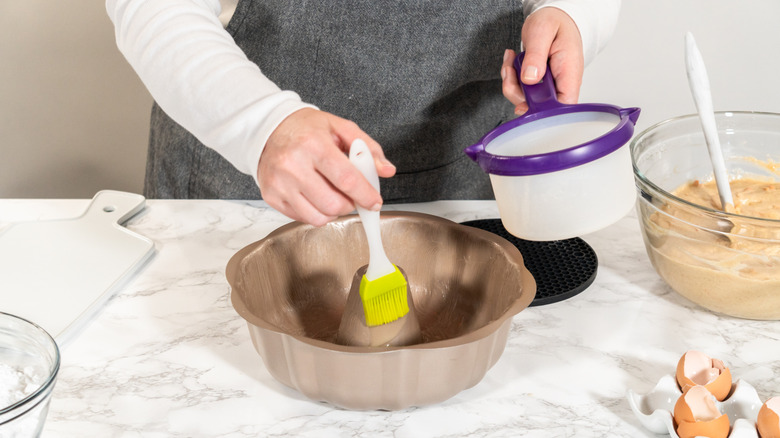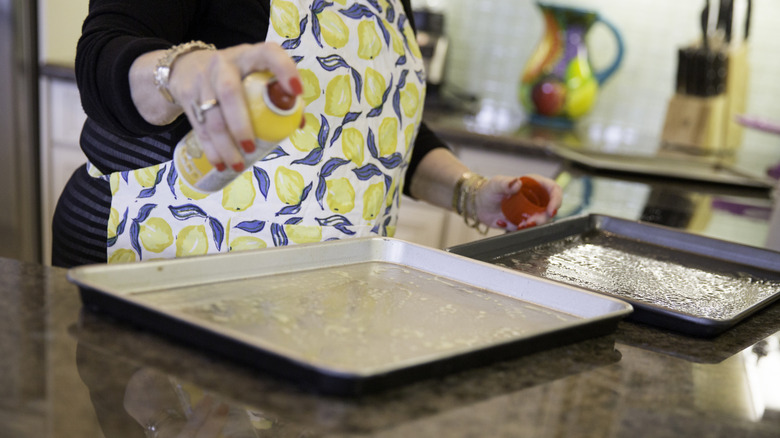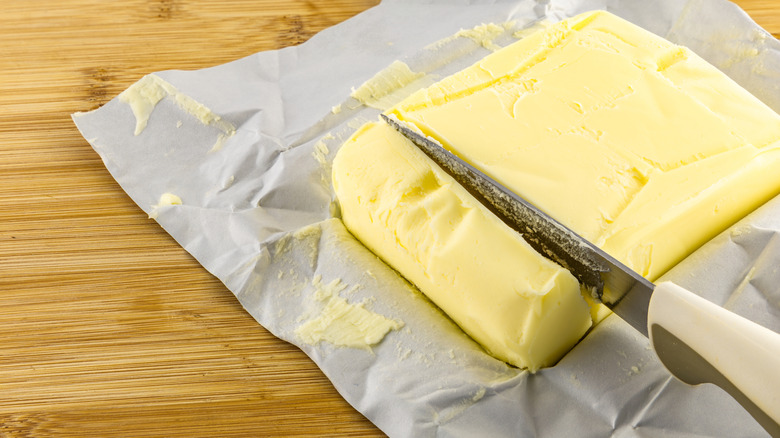Butter Vs Cooking Spray: Which Is Better For Baking?
If you've ever burnt a Bundt cake or a batch of cookies, then you know baking is a precise science. The choice of fat you choose to grease your sheets and pans can have a significant impact on your final sweet treat. Whether you're baking rolls, cupcakes, or an elaborate layer cake, you've likely pondered: Should I splurge on the European-style butter or opt for a can of cooking spray? While both serve the essential purpose of preventing sticking, they come with distinct differences in flavor, texture, and performance. Some swear by the rich, natural qualities of butter, while others prefer the convenience and (mostly) fat-free cooking spray. It's a good idea to explore the pros and cons of each and determine which one is best for your baking needs.
Chef Muhammed Ince, Executive Pastry Chef at the fabulous Fontainebleau Resort in Miami Beach, says that both fats have their place. "Butter adds flavor and helps create that beautiful golden crust — it's perfect for cakes and sweet breads," he advises. "Nonstick spray is great for convenience and when you need a clean release, like for muffins or something baked in a detailed mold." So, it's not really so much a "butter versus spray" situation, but rather it depends on what you're making and the results you're aiming for.
The case for cooking spray
Cooking spray offers an easy, even coating of oil that helps prevent sticking without adding extra moisture. Chef Muhammed Ince notes it's great for "anything that needs a clean release with minimal fuss such as muffins, quick breads, or brownies." It's also particularly useful for baking in intricate molds, where every corner needs to be coated to ensure easy release. Chef Ince agrees, adding, "It's also helpful when baking in a pan with a lot of nooks and crannies, where brushing butter might miss a spot." Plus, since cooking sprays are made from neutral oils like canola or vegetable oil, they don't interfere with the taste of your baked goods.
One slight advantage of cooking spray is its lower fat content. If you're looking to cut down on extra calories or fat in your baking, using spray instead of butter can make a slight (like, really slight) difference. On the other end of that, though, is that cooking spray lacks the oh-so-delicious, taste-enhancing properties of butter. It's certainly not the best option for simple recipes where a buttery taste is key. And even though it seems like a doubly good idea to use nonstick cooking sprays on nonstick cookware, that's actually a big no-no, because the spray will build up over time and mess with the pan's performance.
Team Butter
Butter is a beloved ingredient around the world, especially if you know all the ways to cook with it. Chef Muhammed Ince suggests bringing in the butter when "presentation matters." Because butter contains water and milk solids in addition to fat, it can sometimes encourage sticking rather than preventing it. To avoid this, Chef Ince suggests, "That combo of fat and flour creates a nice nonstick barrier while also supporting the structure as the cake bakes." Though adding flour to butter sounds counter-intuitive, this is where the chemistry of baking really counts. To counteract this, many bakers pair butter with a dusting of flour to prevent sticking.
"You get a beautiful, even crust and a smooth release from the pan," notes Chef Ince. You could also do this flour trick with shortening, which is a type of solid fat, and can often perform better as a lubricant than butter. Shortening is 100% fat, while butter contains at least 80%. This is why most recipes for bundt cake encourage you to use oil spray or shortening, rather than butter. A baker's worst nightmare is to watch their bundt cake fall out of its mold in chunks, rather than gliding out smoothly in all its sculpted beauty. In short (pun intended), there's no one-size-fits-all answer when it comes to butter versus cooking spray. If flavor and texture are top priorities, butter is the way to go. If you're after convenience and an easy release, cooking spray might be your best bet.


